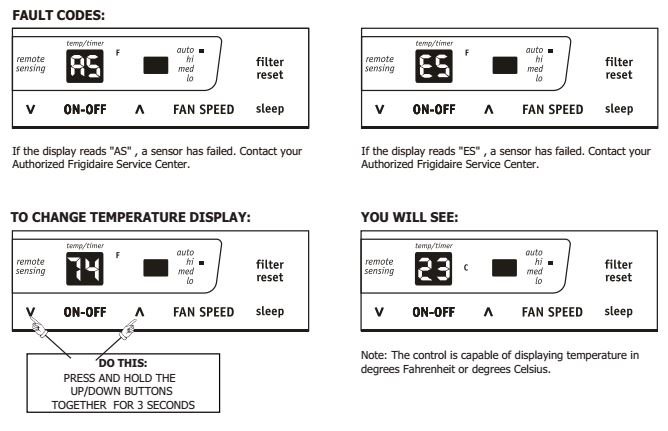
When your air conditioner displays an E3 error, it’s essentially sending out an SOS. This error code is interpreted as an “Indoor Coil Sensor Open or Shorted.” Think of it like your AC’s way of saying, “Hey, something’s not right here!” This sensor is crucial because it helps regulate the unit’s temperature. Ignoring this error might feel like skipping regular check-ups at the doctor’s office—it might seem fine now, but there could be underlying issues brewing.
Why is the E3 Error a Big Deal?
So, you might be wondering why this little sensor issue makes such a big fuss. Well, here’s the deal: the indoor coil sensor is like the thermostat for your air conditioner. It keeps track of the coil’s temperature and ensures the unit cools your home efficiently. If this sensor is malfunctioning, it’s like trying to bake cookies without a timer. You might end up with burnt cookies or, in this case, a burned-out air conditioner.
Ignoring the E3 error won’t just mean uncomfortable, hot days ahead. An unchecked sensor issue can cause the air conditioner to work harder than it should, drawing more electricity and potentially inflating your energy bills. Imagine trying to run a marathon with a twisted ankle—not efficient, right? Your AC feels the same way when it’s operating with faulty sensors. Plus, prolonged strain on the unit could lead to more severe mechanical failures down the line.
And let’s face it, nobody wants to face the inconvenience of a breakdown during a heatwave. Eventually, the prolonged stress on your unit could lead to costly repairs or, worse, the need for a brand-new air conditioner far sooner than you’d planned. Taking immediate action when you see the E3 error is akin to changing the oil in your car regularly—it keeps everything running smoothly and saves you money in the long run.
Common Causes of the E3 Error
Now, let’s delve into what might cause this pesky little E3 error to pop up in the first place. It could be something as simple as a loose connection or a more complex issue like a faulty sensor. Imagine if your phone’s screen started glitching because the battery wasn’t seated correctly. Sometimes, the solution is as simple as a quick fix or a straightforward replacement.
A common cause of the E3 error is a damaged or disconnected sensor wire. This connection is vital for accurate temperature readings. When the wire is compromised, the air conditioner might get “confused,” leading to erratic cooling. Another frequent culprit could be the sensor itself going bad over time. Just like any electronic component, sensors can wear out, leaving your AC unable to gauge temperatures effectively.
In some cases, the error might be due to the sensor being exposed to extreme conditions, like moisture or dust accumulation within the unit. It’s similar to how your laptop might act up if it overheated or collected dust over time. Regular maintenance and cleaning can help prevent these issues from spiraling into more serious problems.
How to Address the E3 Error
What can you do about this E3 error code? Luckily, addressing it doesn’t always mean you’re in for a massive expense or tons of stress. Start by checking the sensor’s connection. Ensure everything is snug and secure—like making sure your charging cable is firmly plugged into your phone. If the connection appears intact, a sensor replacement might be necessary.
Hiring a professional to assess and fix the problem is often the safest route, especially if you’re not handy with electronic repairs. A trained technician can diagnose the issue accurately and ensure you’re not spending money on the wrong fix. Think of it like hiring a mechanic to pinpoint that strange noise your car is making; their expertise can save you a lot of headaches.
Additionally, prevent future issues by scheduling regular maintenance for your AC unit. Simple tasks like cleaning filters and checking connections can extend the life of your air conditioner, keeping error codes at bay. Consider this routine care like brushing your teeth every day—it’s a preventive step that keeps your AC healthy and your home cool.
Preventive Tips to Avoid Future Errors
While it’s great to know how to fix the E3 error, wouldn’t it be even better to avoid it altogether? Regular maintenance is key, much like keeping your garden in check to avoid a jungle of weeds. Make it a habit to check your air conditioner’s connections and sensors once every season. This way, you can catch potential issues before they spiral into major headaches.
Furthermore, consider using a protective cover for your AC unit during off-seasons to shield it from dust and debris. It’s like putting your bicycle in the garage for the winter to keep it from rusting. Keeping your unit clean and dry can significantly reduce the risk of sensor issues.
Another tip is to install a surge protector. A sudden power surge can damage sensitive components, including sensors. Think of it as wearing sunglasses to shield your eyes from sudden bright sunlight. A little protection goes a long way in preserving your AC’s electronics.
In conclusion, treating an E3 error as a priority can save you from a world of trouble, discomfort, and costly repairs. By staying on top of maintenance and addressing issues promptly, you’ll ensure that your trusty Frigidaire air conditioner continues to beat the heat for years to come.